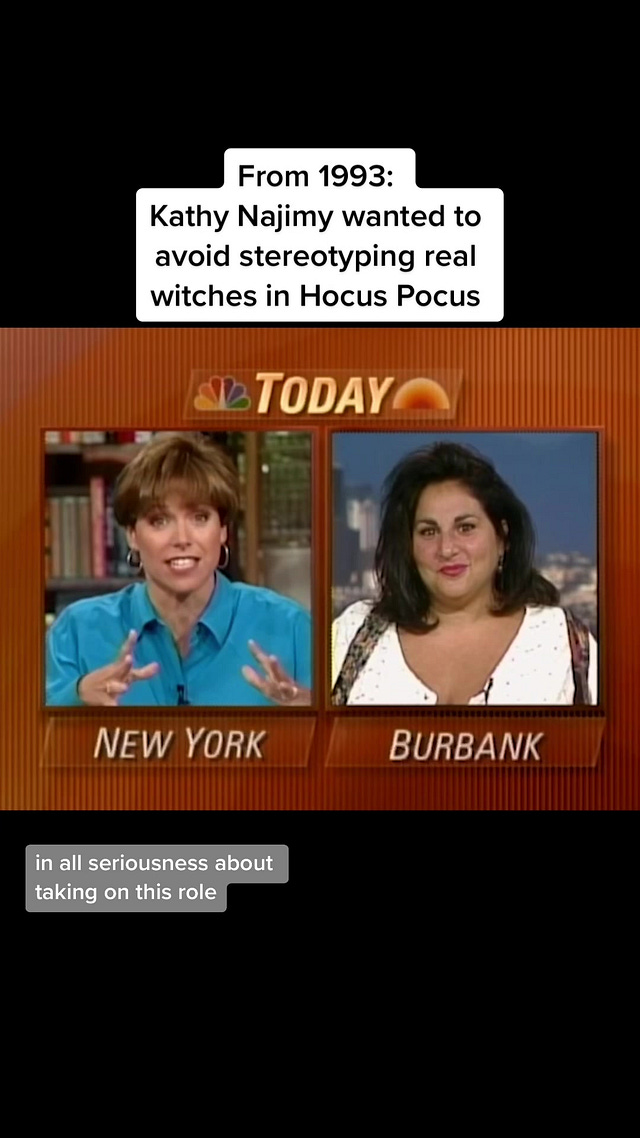Why Do Witches Eat Children?
When my love of Halloween meets my feminist thinking cap, my Google search history gets pretty strange.
Once a year, each October, I gleefully make my husband sit down and watch Hocus Pocus with me. Nostalgia has undeniably influenced my love for this movie, as he is quick to remind me. I can appreciate that when watching with fresh, adult eyes, it’s probably terrible - or at least not the cinematic masterpiece my inner child insists it is. But I hold on nonetheless to the tiny rituals that connect me to childlike fun, especially when it involves spooky stories and Halloween magic. For better or worse, Hocus Pocus has become a quirky, nostalgic thread in the fabric of my Octobers.
Even these rituals, however, do not fall outside of the purview of my proverbial feminist glasses, which have long since become a permanent fixture. They turn beloved classics like Hocus Pocus into something more than just entertainment. I watch it, in part, as a reflection of pop culture and subtle (or not-so-subtle) social commentary. For those who have not had the pleasure of watching the movie, it’s a playful romp about the Sanderson sisters, three centuries-old witches wreaking havoc in Salem who must consume the souls of children in order to stay young and powerful. But in recent years, as I watch it, I find myself asking questions like: Why do parents in Disney films never take their kids seriously? Why are women so often depicted as needing to take something from others in order to stay powerful? And why, in the world, do the Sanderson sisters need to consume children’s souls?
The more I learn about how terribly women have been treated throughout history, the more suspicious I’ve grown of how witches are consistently portrayed as ‘evil’ in pop culture. This portrayal reflects the cultural impact of Christianity’s dominance and expansion, due to which many forms of folk healing, pagan rituals, and female-led practices were labelled as dangerous or heretical. During the Middle Ages and early modern period, accusations of witchcraft were a tool for controlling and punishing people, most often women, who deviated from societal norms or held roles that threatened prevailing patriarchal power structures.
So cut to me on the couch this past week Googling “witches eating children trope”. I found this delightful interview with Kathy Najimy, who played one of the Sanderson sisters, discussing why she was initially cautious about portraying a stereotypical witch.
I spoke with Gloria Steinem about it… and she said that the interesting thing was that originally some of the women who were said to be witches were healthcare workers and midwives. So that’s where the notion of baby eating came, because they would perform abortions sometimes, and so the women would go in pregnant and come out not. Thus, the gossip about baby eating which was untrue - they were just healthcare workers.
In 1484, for example, Pope Innocente VIII published a decree called a papal bull which specifically accused witches of having "slain infants yet in the mother's womb" - in other words, abortion - and of "hindering men from performing the sexual act and women from conceiving" - in other words, contraception.
Condemning those who facilitate reproductive health as evil is still ongoing today. In 2022, US Representative Marjorie Greene said that “abortion is a lie that Satan sells to women.” And there are modern parallels with the witch hunts that happened so long ago. After federal protection of abortion was repealed in the United States, Texas, Idaho, and Oklahoma quickly made abortion illegal and also implemented laws that offered a cash reward to citizens who successfully sued anyone who assisted a woman in obtaining an abortion.
The underlying societal stigma of abortion has been stoked by religious and political leaders for a long, long time, to the extent where it innocuously bleeds into children’s Halloween movies like Hocus Pocus. So perhaps it’s time to replace witches as the baddies with the politicians and religious leaders who oppose reproductive rights. That’s the real horror story.








Brilliant!
love this article - personal and important!!